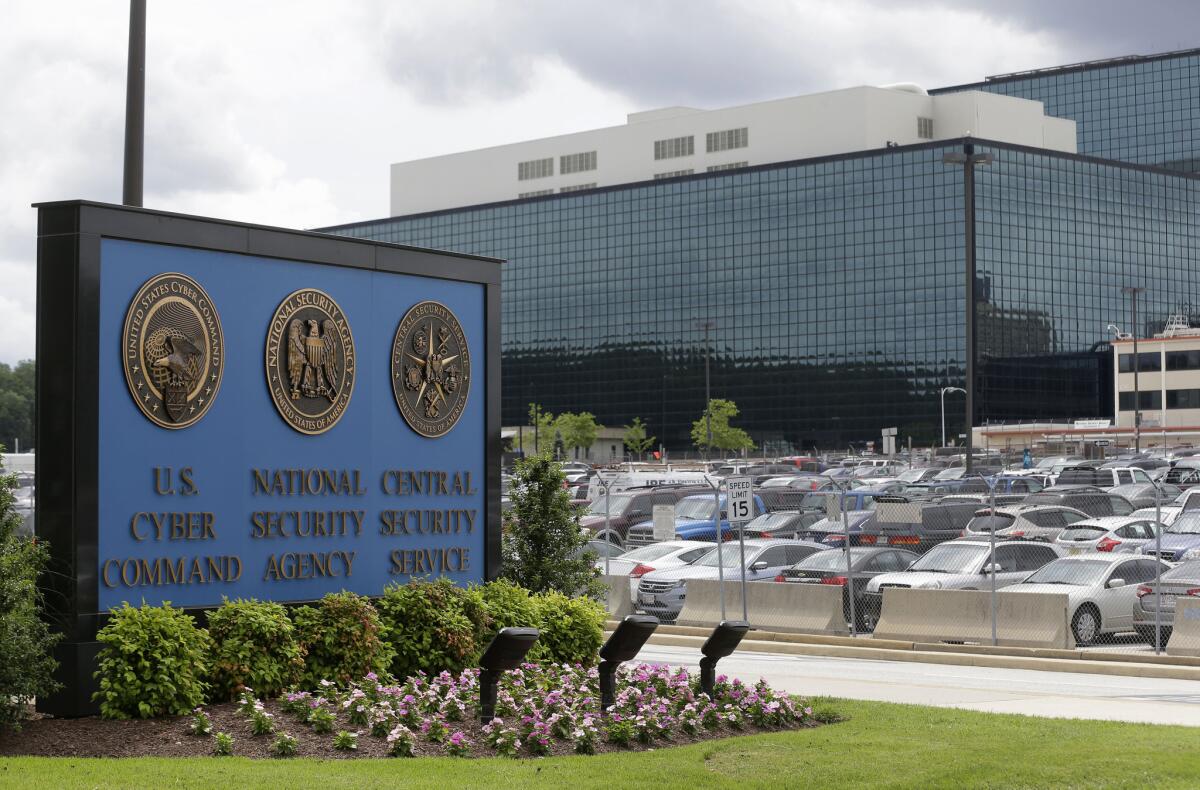Opinion: A specious argument for doing nothing on Patriot Act

Some are calling on Congress to allow the Patriot Act to sunset, which would effectively end the National Security Agency’s collection of phone records. Above, the NSA campus in
- Share via
Many critics of the federal government’s collection of the telephone records of millions of Americans – the most troubling invasion of privacy revealed by Edward Snowden – are hopeful that the Senate will vote Sunday to end the program. It could do so by approving the grandiosely titled USA Freedom Act already approved by the House.
That bill, which the Los Angeles Times editorial board has endorsed, would leave so-called telephone metadata – records about the source, destination and duration of phone calls – in the hands of telephone companies. It would also make it more difficult for government investigators to obtain court approval to “query” or search those records for telephone numbers linked to terrorist plots.
But some critics of the phone program think they have a better idea. The Senate should do nothing, which will have the effect of ending not only the phone-records program but acquisitions of other records under the Patriot Act.
That’s because the section of the law that authorizes such acquisitions expires on June 1, along with two lesser known provisions that were “sunset” by Congress. One allows investigators to initiate “roving wiretaps” designed to capture the communications of terrorism suspects who frequently switch phones. The other provision, which apparently has never been utilized, allows for the surveillance of “lone wolf” foreign terrorism suspects not affiliated with a known organization. All three provisions would be extended for four years under the USA Freedom Act.
In an interview with Glenn Greenwald, the ACLU’s Jameel Jaffer acknowledged that the USA Freedom Act would make “some important improvements,” but added that, on balance, “sunset would be the better course.”
There’s a superficial appeal to the “do nothing” option. A failure by Congress to extend these provisions might seem like poetic justice given the government’s secrecy about how it was using a strained interpretation of the Patriot Act to vacuum up millions of phone records. It’s also true that a task force empaneled by President Obama cast doubt on the usefulness of the phone records program, concluding that information it yielded “was not essential to preventing attacks” and could have been obtained by other means.
But Congress seems determined to preserve the phone records program in some form. And defenders of the USA Freedom Act point out that the bill includes important provisions that go beyond reining in the collection of telephone records. These include the appointment of advocates who could defend privacy interests before the Foreign Intelligence Surveillance Court and the declassification of important opinions by that court.
The USA Freedom Act has its limitations and shouldn’t be the last word in reform of government surveillance programs. (For example, it doesn’t really tackle the “backdoor” collection of information about Americans as a byproduct of electronic eavesdropping on foreigners living abroad.) But its enactment would provide significant protections for privacy.
In this case, doing something beats doing nothing.
Follow Michael McGough on Twitter @MichaelMcGough3
More to Read
A cure for the common opinion
Get thought-provoking perspectives with our weekly newsletter.
You may occasionally receive promotional content from the Los Angeles Times.










